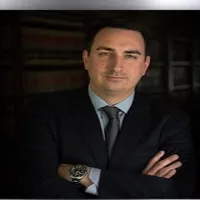What Advice Would You Offer for Managing a Legal Team On a High-Profile Case?
Navigating the intricacies of managing a legal team during a high-profile case requires expertise and finesse. This article distills the wisdom of seasoned legal professionals, offering tactical advice that covers confidentiality, communication, and crisis management. Gain unparalleled insights into effective leadership strategies and technological tools that can make or break a case's success.
- Protect Survivor Confidentiality in High-Profile Cases
- Assign Clear Roles and Maintain Open Communication
- Prioritize Team Resilience in Family Law Cases
- Unify Defense Strategy in Criminal Cases
- Implement Structured Communication for Effective Case Management
- Foster Frequent Team Communication and Delegate Effectively
- Control the Narrative in High-Profile Legal Cases
- Embrace Client-Centered Leadership in Sensitive Cases
- Leverage Technology for Efficient Case Management
- Lead with Clear Delegation and Cross-Department Coordination
- Maintain Consistent Communication and Manage Expectations Proactively
- Avoid Media Comments to Preserve Defense Strategy
Protect Survivor Confidentiality in High-Profile Cases
Managing a high-profile sexual abuse case means ensuring that survivor confidentiality is protected at all costs. My team follows strict confidentiality protocols, including secure document handling, encrypted communication, and controlled access to case files. We also work closely with trauma-informed professionals to ensure that our approach is sensitive to our client's emotional well-being. High-profile cases often attract public curiosity, but our priority is protecting the survivor from unnecessary exposure while aggressively pursuing justice. I train my team to remain vigilant against media leaks, defense tactics designed to intimidate, and institutional pushback--because in these cases, our responsibility is not just legal but deeply ethical.

Assign Clear Roles and Maintain Open Communication
If I had to pick one piece of advice for managing a legal team on a high-profile case, it'd be this: focus on clear roles and open communication. High-stakes cases move fast, and confusion over who's doing what can waste time or create mistakes. Start by matching tasks to your team's strengths--let the detail-oriented person handle research, the persuasive writer draft motions and the calm, quick thinker manage courtroom prep.
Everyone should know exactly what they're responsible for. Then, keep communication simple and frequent. Daily check-ins, even if they're just 10 minutes, help spot issues early and keep everyone aligned. I've seen firsthand how a team that trusts each other's expertise--and isn't afraid to ask questions--can pivot quickly when surprises pop up (and they always do). Finally, don't forget to prep together.
Review strategies as a group, mock cross-examine each other and pressure-test arguments. It builds confidence and catches blind spots. Oh and keep the coffee flowing. A tired team is a sloppy team. After 20+ years in courtrooms, I've learned that even the messiest cases get smoother when people feel heard, valued and clear on the game plan.

Prioritize Team Resilience in Family Law Cases
Handling a high-profile family law case--especially one involving celebrity clients, public divorces, or contentious custody battles--requires more than just legal acumen. It demands strong emotional intelligence and team resilience. I ensure my team is prepared for the intense emotional toll these cases can bring, particularly when the media is involved. We conduct regular check-ins to assess stress levels, encourage open communication, and delegate responsibilities to prevent burnout. Additionally, I emphasize client management, setting realistic expectations and preparing clients for potential media scrutiny. A well-supported team is a highly effective team, and by prioritizing mental well-being alongside legal strategy, we can navigate even the most contentious cases with focus and professionalism.

Unify Defense Strategy in Criminal Cases
When managing a legal team on a high-profile criminal defense case, one of the most important factors is ensuring that all attorneys, paralegals, and investigators operate under a unified defense strategy. High-profile cases often come with extensive media scrutiny, and any inconsistencies in the legal team's approach can be exploited by the prosecution or public perception. I hold regular strategy meetings, where we dissect every piece of evidence, anticipate prosecutorial tactics, and ensure that everyone is aligned in messaging--both in court and, when necessary, in public statements. This cohesion strengthens our defense and prevents miscommunications that could jeopardize the case.

Implement Structured Communication for Effective Case Management
Managing a legal team on a high-profile case requires discipline, strategy, and absolute control over information. The most critical factor is structured communication. A legal team must operate as a single unit, with every member understanding their role and executing it without hesitation.
Assign specific responsibilities. One attorney leads the defense strategy, while others handle motions, witness prep, and jury analysis. Paralegals and investigators should focus on evidence gathering and procedural filings. Without clear roles, confusion creeps in, deadlines are missed, and mistakes happen.
Control internal and external messaging. High-profile cases attract media attention and leaks damage credibility. Limit discussions to essential personnel. Use encrypted communication when necessary. Establish firm guidelines on media interaction--off-the-cuff statements can become courtroom liabilities.
Anticipate pressure. These cases bring long hours, public scrutiny, and intense opposition. A well-managed team maintains focus under stress. Regular debriefings, mental resilience strategies, and controlled workloads prevent burnout. Losing control of the team means losing control of the case.
Look at past high-profile trials. Defense teams that controlled their internal operations and media narratives often shaped the outcome. Those that failed saw external pressures influence legal decisions. The courtroom battle starts long before opening arguments.

Foster Frequent Team Communication and Delegate Effectively
As part of a legal team handling a high-profile case, open and frequent communication is the way to go. The stress and public scrutiny associated with high-profile cases require up-to-the-minute coordination among every member of the team. Right from the start, you must define roles and expectations.
Delegating some of the duties ensures that everyone on the team understands what they are doing and when. For example, when working with medical staff or witnesses, having someone handle these relationships frees up the rest of the team to do their job without worrying about these key details falling through the cracks. This strategy prevents delays and miscommunications.
Daily updates are also essential. Top cases can turn on a dime, and your staff must be adaptable. If anything new occurs or a change of course is needed, the whole team must be informed instantly. This keeps the team all on the same page and prepared for any change of direction.
Keeping your team motivated during these stressful times is just as vital. Long hours and collective effort can lead to burnout. Regular check-ins keep your team operating at peak levels. Addressing any fatigue early on prevents mistakes and keeps morale high. A supported team will deliver under pressure.
Control the Narrative in High-Profile Legal Cases
Our firm makes it a priority to control the narrative by carefully coordinating media responses, ensuring no unauthorized statements are made, and working closely with PR professionals when necessary. Every team member must understand the importance of confidentiality, and we implement strict internal policies to prevent leaks. Additionally, I train my team on how to handle media inquiries, ensuring we stay focused on legal facts rather than speculation. This approach helps protect the integrity of our defense and ensures that the client's case is not tried in the court of public opinion before it reaches an actual courtroom.

Embrace Client-Centered Leadership in Sensitive Cases
Client-centered leadership is the cornerstone of effective legal strategy in sensitive, high-profile cases. It requires more than just legal expertise; it demands a profound commitment to prioritizing the needs and experiences of survivors. This approach fundamentally shifts the focus from simply winning a case to ensuring justice is served in a way that acknowledges and validates the client's trauma. It necessitates creating a safe and supportive environment where survivors feel heard and respected throughout the legal process.
Achieving client-centered leadership requires concrete actions. For example, a leader must prioritize the client's emotional well-being during witness preparation instead of solely focusing on the legal aspects of their testimony. This can be achieved by providing trauma-informed support, explaining the legal process in accessible terms, and allowing the client to control the pace of their participation. Leaders must be mindful of potential triggers and provide resources for emotional support before and after testimony. By focusing on the client's experience, the legal team can ensure that the pursuit of justice is not only legally sound but also ethically responsible and emotionally supportive.
Ultimately, client-centered leadership fosters trust and transparency within the legal team and with the clients. This approach ensures that the pursuit of justice is not just a legal process, but a meaningful step toward healing and validation for those who have been harmed.

Leverage Technology for Efficient Case Management
High-profile personal injury cases often involve vast amounts of evidence, medical records, depositions, and expert testimony. Managing such a case requires an exceptionally organized legal team, and technology plays a key role in maintaining efficiency. I implement robust case management software to streamline document sharing, deadlines, and team collaboration. AI-powered legal research tools help us analyze precedents faster, and digital platforms allow real-time coordination among attorneys, medical experts, and investigators. This ensures that we are always prepared, that no detail is overlooked, and that we can focus on advocating aggressively for our client without getting buried in administrative chaos.
Lead with Clear Delegation and Cross-Department Coordination
When overseeing a legal team on a high-profile case, one of the most crucial aspects is strong leadership and clear delegation. As the CEO of a full-service law firm, I ensure that responsibilities are assigned based on expertise, with lead attorneys, paralegals, and support staff all having defined roles. I emphasize the importance of internal communication through structured meetings, case updates, and collaborative decision-making. High-profile cases often involve various legal specialties, so ensuring seamless coordination across departments--whether criminal defense, civil litigation, or appellate law--is essential. By maintaining a structured, disciplined approach to case management, I can ensure that my team functions at the highest level while delivering the best possible outcomes for our clients.

Maintain Consistent Communication and Manage Expectations Proactively
One key piece of advice for effectively managing a legal team on a high-profile case is to prioritize clear and consistent communication. In these cases, it's crucial that everyone aligns on strategy, goals, and timelines. With many moving parts involved, regular check-ins and updates not only keep everyone informed but also foster an environment where team members feel heard, supported, and motivated. Encourage open dialogue and always manage expectations proactively--this helps prevent misunderstandings, reduces stress, and ensures the entire team stays focused on achieving the end goal, no matter how intense external pressures become.
Happy to share more if you have additional questions!

Avoid Media Comments to Preserve Defense Strategy
Do not discuss the case with the media. High-profile cases can attract news reporters asking for updates. This can go on for months to years in a serious case. The attorney must get used to saying "no comment." If the attorney takes the approach of trying to influence the public with remarks about the case to the press, the defense strategy at trial could be impacted because the defense is now stuck with those comments. Criminal litigation is a constantly changing and evolving process as motions are argued leading up to trial. The attorney doesn't need to get hamstrung at trial because of a comment he made to the press months before.




